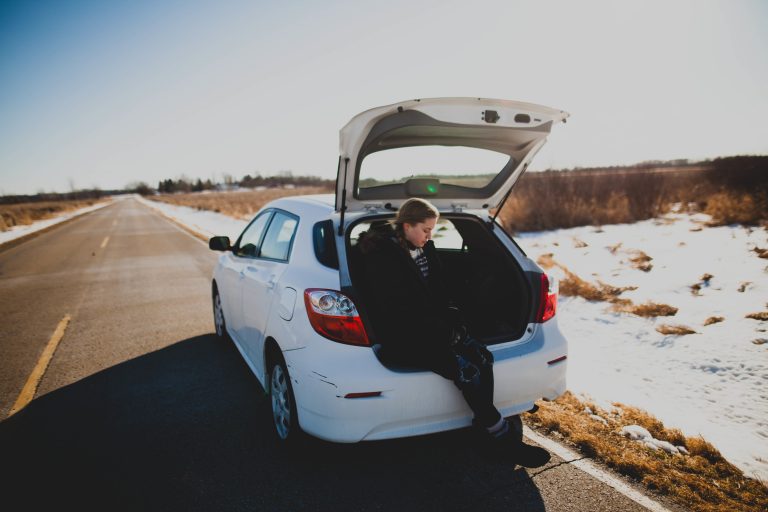
Guess what? You’ve probably driven around the world already and haven’t even realized it. The average American clocks up a massive 79,548 miles on road trips in their lifetime – the equivalent of driving around the world 3.2 times, a new survey shows.
With the upcoming Memorial Day weekend, more people will be hopping in their cars for vacation getaways! According to the results of a new study of 2000 Americans conducted by Pioneer Electronics, the typical road trip stretches for more than five days and covers an average of 612 miles – roughly the distance between NYC and Charlotte, North Carolina.
It turns out that we start early, with our first experience starting at nine years-old with family, and age 19 with friends. Although the road trip with friends can probably get a little more risky, with one in ten respondents saying they would pick up a hitchhiker (men being twice as likely to do so than women).
But that’s not the only risk, the survey shows mishaps such as running out of gas and having nowhere to sleep are regular occurrences. One group of friends even described a 400 mile ski trip to Vermont where they didn’t bother making hotel reservations. The six of them had to sleep in their car in 20-degree weather for a night. It’s also common to run out of gas, with one in 7 admitting to doing so, while over half admit to getting lost at some point.
Luckily, there are some useful strategies for making the most out of your road trips while minimizing the risk – given all the crazy mishaps that can happen, we reached out to Melanie Tucker, certified travel expert and founder of Rare Finds Travel Design. She was able to lay out the best tips to help make your road trip as safe and as enjoyable as possible. Her advice is below:
- The Seat Lottery: Number the seats and each time you get out of the car, to re-enter each passenger must choose a number out of the hat and sit in that seat. Doesn’t matter if you’ve been traveling for 5 minutes or 5 hours – you switch. Keeps the fraternization nice and even.
- Geography 101: Get a large-scale map of the US (or of the region you are traveling) and tape it to the ceiling of your car. With bright makers, trace your route as you go. This gives passengers a visual, teaches geography, and gives an immediate answer to anyone who dares to ask “Are we there yet?”
- Create themes: Create a theme for long stretches, like “Stopping ONLY at Dairy Queen between here and home” Pick a theme: in addition to the “We’re only going to eat Dairy Queen all the way home”, try:
- Weird USA (by Moran & Sceurman): Stop at random highlights like UFO Watch Tower in Colorado, Sea Lion in, Mojave Airplane Graveyard in California, the ghost of Washington’s Thornewood Castle, the beer can house in Houston and the Land of the Giants in Sparta WI.
- Eat your way across the USA: Try typical dishes in each region. We ate pasties in the mining towns of Montana… the Vemonster at the Ben&Jerry’s factory in Vermont.. the lobster challenge in Maine… and best beignets in New Orleans’ Cafe du Monde
[youtube https://www.youtube.com/watch?v=UDlt9gbbD4A&w=560&h=315]
Take a break at night to sleep in unusual lodging, like:
- lighthouses from San Francisco CA to Saugerties NY
- yurts on the PCH in California
- an underground cave suite at the Grand Canyon Caverns AZ
- Under Canvas clamping property at Moab UT
- a houseboat on Lake Powell
- haunted hotel in Williams, AZ
- or the Ice Hotel, just over the border in Quebec
- Clocking miles: Alternate the pace of your days and make time at night. Waking at 8 and drive for 6 hours each day produces a monotony that makes everyone cranky – you never seem to get there and you never seem to just play! It’s better to plow through the miles on one day, even if it means 16-24 hours of driving (switching drivers for safety, of course) and then have some down time.
- Check your itinerary against a calendar of events for the area you are driving through – 4th of July, logging festivals, jazz or celtic fests, oyster fests, street fairs, First Fridays (Art fairs), hot air balloon festivals, food truck rallies, the Spam festival (no kidding) and more.
- Start a group journal where everyone contributes in their own way – you can sketch, add a postcard, write a poem, jot down history that you learned, tape natural products like flowers or spanish moss, make lists (things I hate about going across Kansas OR all the places I ate chowder in Alaska).
- Everyone gets one pick! At start of road trip, let everyone pick one activity they want to do and then make sure to incorporate one wish from each person into the itinerary.
- He who drives decides. Driver controls wheel. And the person riding in shotgun is Driver’s Assistant – organizes music, gets snacks, programs GPS, solves problems, manages portable hotspot, so that the driver is not distracted, and it prevents backseat interference.
- When you get out of the car, book in solo time where everyone can go their own direction, if only for an hour. At the hotel, escape to the pool or go for a run. At the campsite go for a walk or rest in your tent. At the mall get a bite to eat or shop. In the city head, out in any direction. Solo time is important to let people get some space and not feel forced into group interaction 24/7 (because you may think you love each other, but after 12 hours stuck side by side crossing the flat fields of Kansas, you may wonder!)
As it turns out, spending quality time APART while road tripping is actually a very important skill to have. Drivers on average take a break every three hours, and make three stops each day for gas, bathroom breaks, and food. Make the most out of those moments out of the car, and it will help you make the most of those moments in them – keeping the love of road trips alive for the next generation.

END


















